|
|
|
Sort Order |
|
|
|
Items / Page
|
|
|
|
|
|
|
| Srl | Item |
| 1 |
ID:
179014
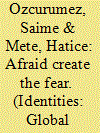

|
|
|
|
|
| Summary/Abstract |
This study investigates the perceptions of the local female population towards displaced Syrians in Turkey. The research is based on the analysis of data from participant observation and discourse analysis of conversations in five ‘gün’ groups, which are informal, social, and fairly regular gatherings of local women, in Mersin in Spring 2018. Five common discursive patterns are identified: stereotyping, biased perceptions, ‘us’ vs. ‘them’, scapegoating, and discrimination. We conclude that local women’s discourses reveal marginalisation and discursive exclusion of displaced Syrians in Turkey, and argue that such othering originates not only from existing cultural differences, language barriers, and lack of trust, but also from lack of sustained social interaction between these groups. Further studies should facilitate both knowledge sharing about the additional vulnerabilities such attitudes create for displaced people and potential paths for meaningful engagement between local community members and forcibly displaced people.
|
|
|
|
|
|
|
|
|
|
|
|
|
|
|
|
| 2 |
ID:
190100
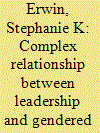

|
|
|
|
|
| Summary/Abstract |
Leadership, whether through response, composition, representation, or direction, reflects a complex relationship with gender in the military. The findings of this qualitative study highlighted the profound and complex relationship between leadership and gendered experiences within the military in a variety of facets including within various ranks, from superiors, subordinates, and peers, as well as both as and with leaders. This includes considerations, or lack thereof, for issues pertaining to representation, voice, gender bias, stereotyping, and intersectionality in addition to the significant and prominent issues of sexual misconduct. Military leadership development efforts, both at large and for women in particular, must reflect the pivotal role which leadership plays while simultaneously acknowledging the unique cultural and contextual environment of the military. In addition to continued efforts to encourage and enable women’s military service and leadership, military and civilian leadership, regardless of gender, should be cognizant of the magnitude of leader roles and responsibilities pertaining to gender.
|
|
|
|
|
|
|
|
|
|
|
|
|
|
|
|
| 3 |
ID:
173206
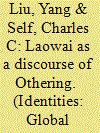

|
|
|
|
|
| Summary/Abstract |
Homogeneous ethnic labels, deriving from migrants’ phenotypic and cultural distinctness, are frequently utilised to single them out as the Other during intercultural encounters. Nonetheless, the Othering enacted by ethnic labelling has not attracted enough attention from host-nationals who use these labels. In-depth interviews with 35 American expatriates revealed that laowai was perceived as a discourse of Othering, which first categorised Westerners under this label as the Other in mainland China for their noticeable non-Chinese physical appearance, and then exposed them to its Chinese users’ diversely motivated stereotyping in such forms as exclusion, alienation and discrimination. However, Chinese people had not noticed laowai’s nature of being a stereotype-laden discourse of Othering and conversely considered this label as a neutral and even friendly expression. Ultimately, these Americans experienced Chinese people’s habitual use of laowai as a way to separate them as permanent outsiders who were subject to Occidentalism in mainland China.
|
|
|
|
|
|
|
|
|
|
|
|
|
|
|
|
| 4 |
ID:
169035
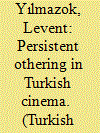

|
|
|
|
|
| Summary/Abstract |
In Turkish cinema, the regular narrative of exclusion or othering of minority ethnic, religious, and gender identities harnesses the nation-building process against groups that function as the ‘constitutive outsider.’ Although recent Turkish cinema has challenged many established cultural patterns, this challenge does not yet extend to stereotyped and heavily gendered constructions of Greek identity. In this paper, I argue that these constructions are persistent, and can be seen in recent films. Specifically, I demonstrate that Greek characters are limited to a few stereotypical names and roles, assigned heavy Turkish accents, and for the most part, confined to female roles depicted primarily as ‘indecent’ and/or objects of the male gaze.
|
|
|
|
|
|
|
|
|
|
|
|
|
|
|
|
| 5 |
ID:
187290
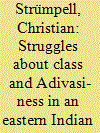

|
|
|
|
|
| Summary/Abstract |
In the eastern Indian steel town of Rourkela, Adivasis are widely stereotyped as uneducated, jangli (‘wild’), and drinkers, and they are therefore held to make for a special type of worker. Their Adivasi ‘nature’ makes them an ideal fit for facing the heat, dust, and fumes in the so-called ‘hot shops’ of the local public-sector steel plant. It is also said that Adivasis are, in fact, not well suited for the permanent and well-paid jobs the public-sector steel plant provides, and that they are better employed as contract workers who are paid little and by the day, and on whom the industry has increasingly relied since the 1970s. Critically engaging with Bourgois’ concept of ‘conjugated oppression’, I will show how these casteist stereotypes entrench the class position of Adivasis in the local steel industry, but also how this position has nevertheless changed over time—for some for the better, for many for the worse. Furthermore, although this polarization is driven by larger political economic changes it is exacerbated by the ways in which the better-off among the stereotyped Adivasi workers respond to them. This calls, I argue, for close attention to be given to the historical dynamics in the relations between class and caste (or ‘tribe’) and in the struggles related to them.
|
|
|
|
|
|
|
|
|
|
|
|
|
|
|
|
|
|
|
|
|